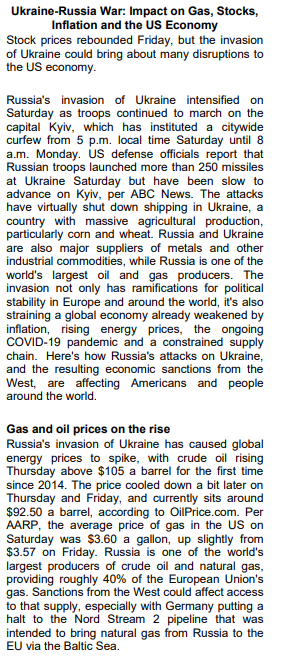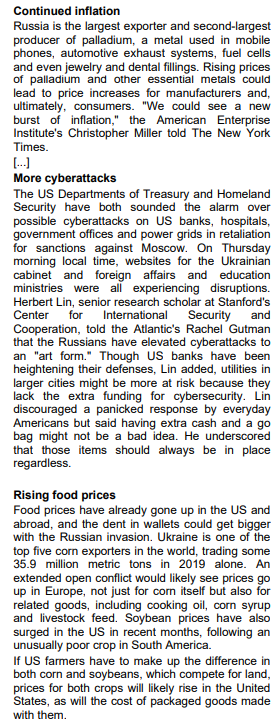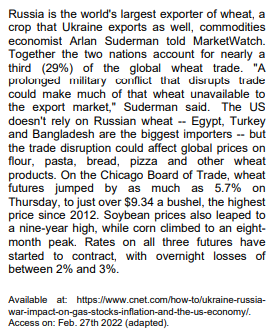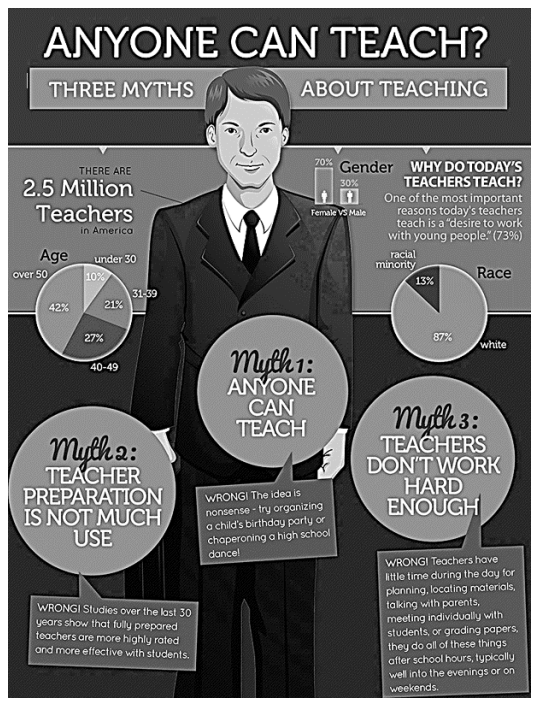TEXT 5 Answer the questions from 54 to 60 according to the text 5.
Ukraine-Russia War: Impact on Gas, Stocks, Inflation and the US Economy
Stock prices rebounded Friday, but the invasion of Ukraine could bring about many disruptions to the US economy.
Russia's invasion of Ukraine intensified on Saturday as troops continued to march on the capital Kyiv, which has instituted a citywide curfew from 5 p.m. local time Saturday until 8 a.m. Monday. US defense officials report that Russian troops launched more than 250 missiles at Ukraine Saturday but have been slow to advance on Kyiv, per ABC News. The attacks have virtually shut down shipping in Ukraine, a country with massive agricultural production, particularly corn and wheat. Russia and Ukraine are also major suppliers of metals and other industrial commodities, while Russia is one of the world's largest oil and gas producers. The invasion not only has ramifications for political stability in Europe and around the world, it's also straining a global economy already weakened by inflation, rising energy prices, the ongoing COVID-19 pandemic and a constrained supply chain. Here's how Russia's attacks on Ukraine, and the resulting economic sanctions from the West, are affecting Americans and people around the world.
Gas and oil prices on the rise
Russia's invasion of Ukraine has caused global energy prices to spike, with crude oil rising Thursday above $105 a barrel for the first time since 2014. The price cooled down a bit later on Thursday and Friday, and currently sits around $92.50 a barrel, according to OilPrice.com. Per AARP, the average price of gas in the US on Saturday was $3.60 a gallon, up slightly from $3.57 on Friday. Russia is one of the world's largest producers of crude oil and natural gas, providing roughly 40% of the European Union's gas. Sanctions from the West could affect access to that supply, especially with Germany putting a halt to the Nord Stream 2 pipeline that was intended to bring natural gas from Russia to the EU via the Baltic Sea.
Continued inflation
Russia is the largest exporter and second-largest producer of palladium, a metal used in mobile phones, automotive exhaust systems, fuel cells and even jewelry and dental fillings. Rising prices of palladium and other essential metals could lead to price increases for manufacturers and, ultimately, consumers. "We could see a new burst of inflation," the American Enterprise Institute's Christopher Miller told The New York Times.
[...]
More cyberattacks
The US Departments of Treasury and Homeland Security have both sounded the alarm over possible cyberattacks on US banks, hospitals, government offices and power grids in retaliation for sanctions against Moscow. On Thursday morning local time, websites for the Ukrainian cabinet and foreign affairs and education ministries were all experiencing disruptions. Herbert Lin, senior research scholar at Stanford's Center for International Security and Cooperation, told the Atlantic's Rachel Gutman that the Russians have elevated cyberattacks to an "art form." Though US banks have been heightening their defenses, Lin added, utilities in larger cities might be more at risk because they lack the extra funding for cybersecurity. Lin discouraged a panicked response by everyday Americans but said having extra cash and a go bag might not be a bad idea. He underscored that those items should always be in place regardless.
Rising food prices
Food prices have already gone up in the US and abroad, and the dent in wallets could get bigger with the Russian invasion. Ukraine is one of the top five corn exporters in the world, trading some 35.9 million metric tons in 2019 alone. An extended open conflict would likely see prices go up in Europe, not just for corn itself but also for related goods, including cooking oil, corn syrup and livestock feed. Soybean prices have also surged in the US in recent months, following an unusually poor crop in South America.
If US farmers have to make up the difference in both corn and soybeans, which compete for land, prices for both crops will likely rise in the United States, as will the cost of packaged goods made with them. Russia is the world's largest exporter of wheat, a crop that Ukraine exports as well, commodities economist Arlan Suderman told MarketWatch. Together the two nations account for nearly a third (29%) of the global wheat trade. "A prolonged military conflict that disrupts trade could make much of that wheat unavailable to the export market," Suderman said. The US doesn't rely on Russian wheat -- Egypt, Turkey and Bangladesh are the biggest importers -- but the trade disruption could affect global prices on flour, pasta, bread, pizza and other wheat products. On the Chicago Board of Trade, wheat futures jumped by as much as 5.7% on Thursday, to just over $9.34 a bushel, the highest price since 2012. Soybean prices also leaped to a nine-year high, while corn climbed to an eight-month peak. Rates on all three futures have started to contract, with overnight losses of between 2% and 3%.
Available at: https://www.cnet.com/how-to/ukraine-russia-war-impact-on-gas-stocks-inflation-and-the-us-economy/. Access on: Feb. 27th 2022 (adapted).
The main idea of the text is:
TEXT 5 Answer the questions from 54 to 60 according to the text 5.
Ukraine-Russia War: Impact on Gas, Stocks, Inflation and the US Economy
Stock prices rebounded Friday, but the invasion of Ukraine could bring about many disruptions to the US economy.
Russia's invasion of Ukraine intensified on Saturday as troops continued to march on the capital Kyiv, which has instituted a citywide curfew from 5 p.m. local time Saturday until 8 a.m. Monday. US defense officials report that Russian troops launched more than 250 missiles at Ukraine Saturday but have been slow to advance on Kyiv, per ABC News. The attacks have virtually shut down shipping in Ukraine, a country with massive agricultural production, particularly corn and wheat. Russia and Ukraine are also major suppliers of metals and other industrial commodities, while Russia is one of the world's largest oil and gas producers. The invasion not only has ramifications for political stability in Europe and around the world, it's also straining a global economy already weakened by inflation, rising energy prices, the ongoing COVID-19 pandemic and a constrained supply chain. Here's how Russia's attacks on Ukraine, and the resulting economic sanctions from the West, are affecting Americans and people around the world.
Gas and oil prices on the rise
Russia's invasion of Ukraine has caused global energy prices to spike, with crude oil rising Thursday above $105 a barrel for the first time since 2014. The price cooled down a bit later on Thursday and Friday, and currently sits around $92.50 a barrel, according to OilPrice.com. Per AARP, the average price of gas in the US on Saturday was $3.60 a gallon, up slightly from $3.57 on Friday. Russia is one of the world's largest producers of crude oil and natural gas, providing roughly 40% of the European Union's gas. Sanctions from the West could affect access to that supply, especially with Germany putting a halt to the Nord Stream 2 pipeline that was intended to bring natural gas from Russia to the EU via the Baltic Sea.
Continued inflation
Russia is the largest exporter and second-largest producer of palladium, a metal used in mobile phones, automotive exhaust systems, fuel cells and even jewelry and dental fillings. Rising prices of palladium and other essential metals could lead to price increases for manufacturers and, ultimately, consumers. "We could see a new burst of inflation," the American Enterprise Institute's Christopher Miller told The New York Times.
[...]
More cyberattacks
The US Departments of Treasury and Homeland Security have both sounded the alarm over possible cyberattacks on US banks, hospitals, government offices and power grids in retaliation for sanctions against Moscow. On Thursday morning local time, websites for the Ukrainian cabinet and foreign affairs and education ministries were all experiencing disruptions. Herbert Lin, senior research scholar at Stanford's Center for International Security and Cooperation, told the Atlantic's Rachel Gutman that the Russians have elevated cyberattacks to an "art form." Though US banks have been heightening their defenses, Lin added, utilities in larger cities might be more at risk because they lack the extra funding for cybersecurity. Lin discouraged a panicked response by everyday Americans but said having extra cash and a go bag might not be a bad idea. He underscored that those items should always be in place regardless.
Rising food prices
Food prices have already gone up in the US and abroad, and the dent in wallets could get bigger with the Russian invasion. Ukraine is one of the top five corn exporters in the world, trading some 35.9 million metric tons in 2019 alone. An extended open conflict would likely see prices go up in Europe, not just for corn itself but also for related goods, including cooking oil, corn syrup and livestock feed. Soybean prices have also surged in the US in recent months, following an unusually poor crop in South America.
If US farmers have to make up the difference in both corn and soybeans, which compete for land, prices for both crops will likely rise in the United States, as will the cost of packaged goods made with them. Russia is the world's largest exporter of wheat, a crop that Ukraine exports as well, commodities economist Arlan Suderman told MarketWatch. Together the two nations account for nearly a third (29%) of the global wheat trade. "A prolonged military conflict that disrupts trade could make much of that wheat unavailable to the export market," Suderman said. The US doesn't rely on Russian wheat -- Egypt, Turkey and Bangladesh are the biggest importers -- but the trade disruption could affect global prices on flour, pasta, bread, pizza and other wheat products. On the Chicago Board of Trade, wheat futures jumped by as much as 5.7% on Thursday, to just over $9.34 a bushel, the highest price since 2012. Soybean prices also leaped to a nine-year high, while corn climbed to an eight-month peak. Rates on all three futures have started to contract, with overnight losses of between 2% and 3%.
Available at: https://www.cnet.com/how-to/ukraine-russia-war-impact-on-gas-stocks-inflation-and-the-us-economy/. Access on: Feb. 27th 2022 (adapted).
In “We could see a new burst of inflation”, the underlined word could be replaced, without prejudice to meaning, by:
In relation to the data presented in the text, mark the following statements as either true (T) or false (F).
( ) There are less than 2 million teachers in America.
( ) There are less male teachers than female teachers.
( ) There are more teachers between 31 and 39 years old than teachers between 40 and 49 years old.
( ) There are more teachers over 50 years old than teachers under 49 years old.
( ) There are more white teachers than racial minority teachers.
Mark the alternative with the correct sequence.
Choose the only alternative in which all the words start with a silent letter:
Qual das seguintes alternativas pode ser considerada um direito ou garantia fundamental “fora do catálogo”?
Referente aos direitos sociais previstos no art. 6º da Constituição da República Federativa do Brasil de 1988, assinale a alternativa correta.
Sobre o direito à saúde, assinale a alternativa INCORRETA.
Conforme a jurisprudência dos Tribunais Superiores, assinale a alternativa INCORRETA.
Referente à Inclusão digital e ao acesso à internet, assinale a alternativa correta.
De acordo com a jurisprudência do Supremo Tribunal Federal, assinale a alternativa correta.
“Justiça condena seis policiais militares de Curitiba por tortura.
Seis policiais militares foram condenados a quatro anos e um mês de prisão por tortura. Os PMs também foram exonerados e não podem exercer qualquer função pública por oito anos e seis meses. A decisão é da 11 Vara Criminal de Curitiba, atendendo denúncia feita pelo Grupo de Atuação Especial de Combate do Crime Organizado (Gaeco), do Ministério Público do Paraná (MP-PR).
O caso pelo qual os policiais foram condenados aconteceu na noite de 20 de julho de 2015. Por volta das 21h, os PMs abordaram dois suspeitos na Cidade Industrial de Curitiba (CIC). Os suspeitos foram mantidos pelos policiais na casa de um deles, onde foram algemados e agredidos com socos, chutes e asfixiamento por cerca de uma hora e meia. De acordo com a denúncia do Gaeco, houve também violência sexual e ameaças de morte.
Após uma hora e meia de agressões na residência, os dois suspeitos foram levados pelos policiais em viaturas distintas até a represa do Rio Passaúna. Lá, foram obrigados a entrar na água e nadar enquanto os policiais atiravam na água para impedir que ambos retornassem à margem.”
Disponível em: https://tribunapr.uol.com.br/noticias/seguranca/justica-condena-seis-policiais-militares-de-curitiba-por-tortura/ Acesso em: 28 jan. 2021.
Tal notícia relata ato praticado por agente público de maneira irregular e violenta, característica essa
Pedro, que já foi condenado por roubo em 2003, com a correlata pena extinta em 2011, foi denunciado, em 2017, pela prática de um novo crime. Na denúncia, lhe foi imputada a subtração, mediante rompimento de obstáculo, de coisa alheia móvel avaliada em R$ 1.000,00, pertencente ao seu genitor Fabiano, que possuía 60 anos de idade. Na data do crime dessa nova denúncia, o salário-mínimo era de R$ 937,00. A sentença será prolatada em 2021, quando o salário-mínimo é de R$ 1.100,00.
Diante dessa situação hipotética e considerando a legislação aplicável e o entendimento dos Tribunais Superiores, assinale a alternativa correta.
A respeito do habeas corpus, analise as assertivas a seguir e assinale a alternativa correta.
I. A Defensoria Pública impetrou habeas corpus em favor de réu em processo penal, alegando a ausência de justa causa para a acusação, posto que baseada em elementos de informação obtidos em busca e apreensão ilegalmente realizadas. Antes do julgamento do mérito do habeas corpus, foi proferida sentença condenatória. Nesse caso, não haverá prejuízo ao julgamento do habeas corpus.
II. João foi condenado definitivamente ao cumprimento de pena de 3 anos de reclusão e 10 dias-multa, a ser cumprido em regime inicial semiaberto. Finalizado o cumprimento da pena privativa de liberdade, João procurou a Defensoria Pública, alegando que não possui recursos financeiros para pagar a multa aplicada e, por causa de seus antecedentes, não consegue emprego. Nesse caso, por se tratar de dívida de valor submetida ao regime de execuções fiscais, a Defensoria Pública poderá impetrar habeas corpus, requerendo a declaração da extinção da punibilidade.
III. O Ministério Público do Estado do Paraná instaura, de ofício, procedimento investigatório direcionado a apurar a prática reiterada de crime de receptação supostamente praticado por Carlos. O procedimento tramita há 8 anos e, até a presente data, não houve oferecimento de denúncia. Carlos procura a Defensoria Pública alegando prejuízos de ordem moral e material decorrentes da persistência da investigação contra sua pessoa. Nesse caso, o membro da Defensoria Pública deverá impetrar habeas corpus, perante o Juízo de primeiro grau, postulando o trancamento da investigação preliminar.
IV. O habeas corpus não comporta legitimação extraordinária, pois se trata de remédio constitucional que pode ser impetrado por qualquer pessoa, sem auxílio de advogado. V. Augusto, professor de nível primário, foi denunciado por suposto estupro de vulnerável. O Ministério Público requereu sua prisão preventiva, mas o Juiz indeferiu o pedido e decretou medida cautelar de afastamento da função pública. Nesse caso, a decisão não poderá ser atacada por habeas corpus, pois não há ofensa ao direito ambulatorial de Augusto






